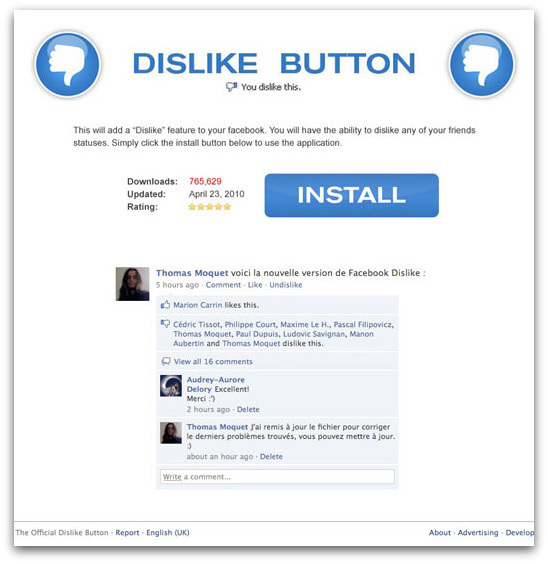After years and years of clamoring by a certain subset of the userbase, Mark Zuckerberg announced that Facebook is finally building a “dislike” button. Is this a good idea? Who knows? Facebook does a lot of things – some of them work and some of them don’t.
What I do know is that the much-publicized dislike button will not be the mean-spirited, I think your baby is ugly button that some fear it will be.
Not that it wouldn’t become that if Facebook just unveiled a straight dislike option on all posts – that’s exactly what would happen. But Facebook isn’t going to do that.
Do you want a dislike button? Do you think it would help or harm feedback on the site? Let us know in the comments.
It’s important to look at exactly what Mark Zuckerberg said about the new button at Tuesday’s Q&A:
I think people have asked about the dislike button for many years and probably hundreds of people have asked about this, and today is a special day because today is the day where I actually get to say that we’re working on it, and are very close to shipping a test of it.
You know, it took us awhile to get here. Because you know, we didn’t want to just build a dislike button because, you know, we don’t want to turn Facebook into a forum where people are voting up or down on people’s posts. Right? That doesn’t seem like the kind of community that we want to create. I mean, you don’t want to go through the process of sharing some moment that was important to you in your day and then have someone downvote it. That isn’t what we’re here to build in the world.
But over the years of people asking for this, what we kind of have come to understand is that people aren’t looking an ability to downvote other people’s posts. What they really want is to be able to express empathy.
You know, not every moment is a good moment, right? And if you are sharing something that is sad, whether it’s something in current events like the refugee crisis that touches you or if a family member past away, then it might not feel comfortable to Like that post. But your friends and people want to be able to express that they understand and that they relate to you.
So I do think that it’s important to give people more options than just Like as a quick way to emote and share what they’re feeling on a post, so we’ve been working on this for awhile. It’s surprisingly complicated to make an interaction that you want to be that simple. But we have an idea that we think we’re going to be ready to test soon, and depending on how that does, we’ll roll it out more broadly.
But thank you for all the feedback on this over the years. I think we’ve finally heard you and we’re working on this and hopefully we will deliver something that meets the needs of our community
Over the years, Facebook has rebuked the idea of a dislike button, and the company has always said the same thing – it didn’t want to bring that sort of negativity to the site. Zuck also said he didn’t want to institute a reddit-like upvote/downvote system. Both of these points are echoed in Zuckerberg’s latest statement.
“What they really want is to be able to express empathy,” he says. And that’s what we’re likely to get with the new dislike button – a way to show support for friends when their posts aren’t exactly positive.
Like is an awkward sentiment when someone’s grandma dies. Dislike is more appropriate.
But will it even be a true “dislike” button? Or will is say something like “I’m sorry” or “Condolences”?
And will it simply be one new button? “I do think that it’s important to give people more options than just Like as a quick way to emote and share what they’re feeling on a post”… but “it’s surprisingly complicated to make an interaction that you want to be that simple,” says Zuckerberg. Will post context determine what that other option is?
There are a lot of questions about the upcoming dislike button and what form it will take. For the average user, a button that expresses empathy could be used just like the like button – as a news feed ranking signal. It could help posts that don’t get a lot of likes because of their delicate subject matter rise to to the top as Facebook’s algorithms could have another way to decide whether or not a post is interesting and generating feedback.
Same for pages. But if you’re worried about people disliking your page posts and further destroying your post visibility – you probably shouldn’t be. Like Zuckerberg said, he doesn’t want a situation where posts are being downvoted into oblivion.
You also shouldn’t worry about receiving DISLIKES on all your selfies. Facebook doesn’t want to scare people away. Making people scared to post for fear of having their feelings hurt isn’t exactly good for business.
What form do you think the dislike button will take? Let us know in the comments.









